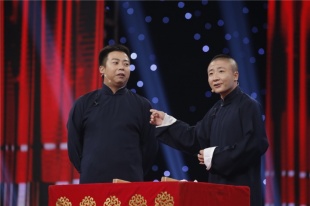A pot of tea, a few snacks and a bowl of laughs


The art of crosstalk has gone through crises in its 100 years of existence, but thanks to the persistence of many it is doing more than just surviving.
Guo Degang, who started studying xiangsheng when he was 7 and left his hometown of Tianjin to open his first club in Beijing in 1995, is credited with reviving crosstalk by giving sold-out shows, enjoyed by young and old alike. He gained movie-star-like fame, and his students, who are members of his xiangsheng performance group called Deyunshe, also drew a lot of attention.
His eldest son, Guo Qilin, also a xiangsheng performer, has expanded his career into reality shows, TV dramas and movies, and is a constant object of attention among young fans and paparazzi. Besides Guo, Miao Fu and Wang Sheng, two xiangsheng performers from Tongchuan, Shaanxi province, also gained a fan base in the country with their Shaanxi dialect.
In the first half of the 20th century xiangsheng was performed mainly in teahouses. After the founding of New China in 1949 most of the comedians were recruited into State-run performing arts troupes and xiangsheng shows in teahouses gradually disappeared.
However, with teahouses mushrooming in recent years, there has been a revival. The old art form is also widely broadcast on TV and radio stations. More than 30 teahouses in Tianjin offer xiangsheng shows every day.



































